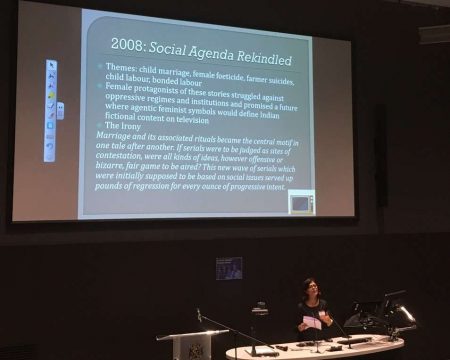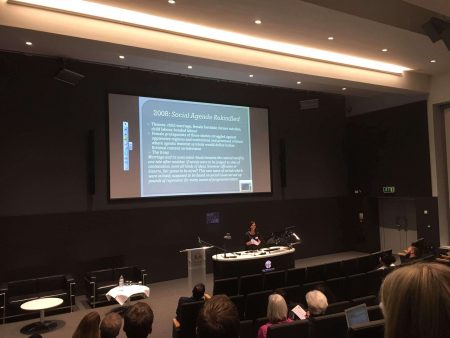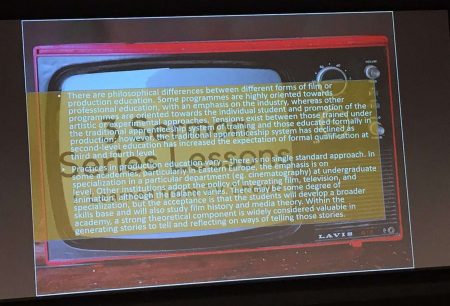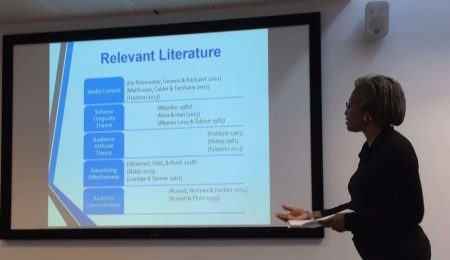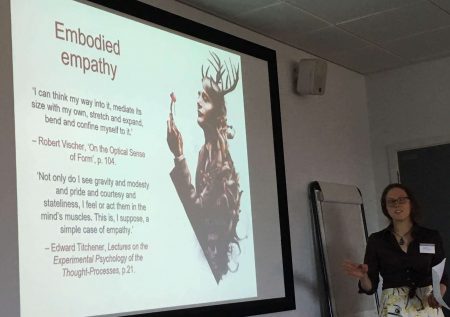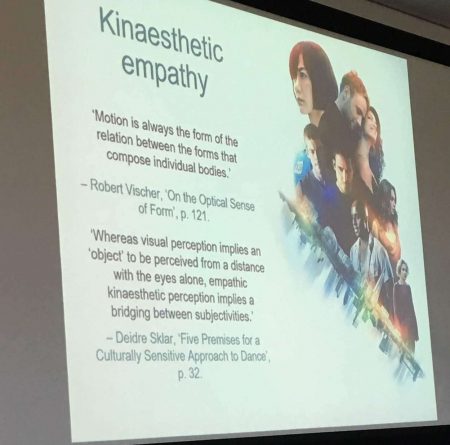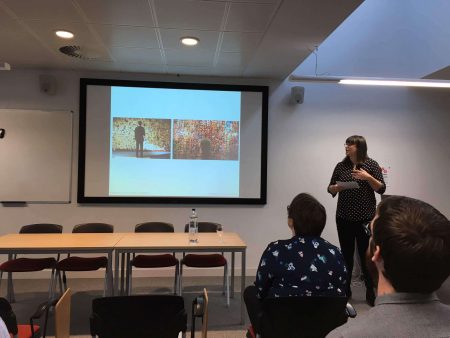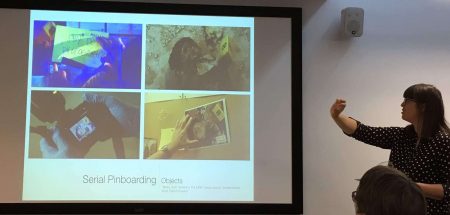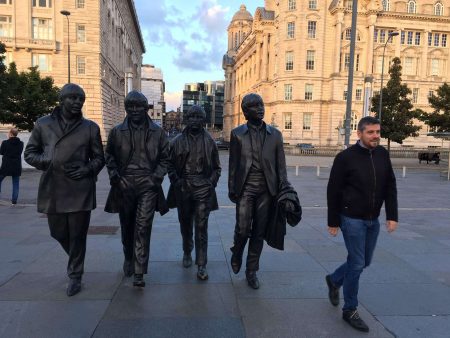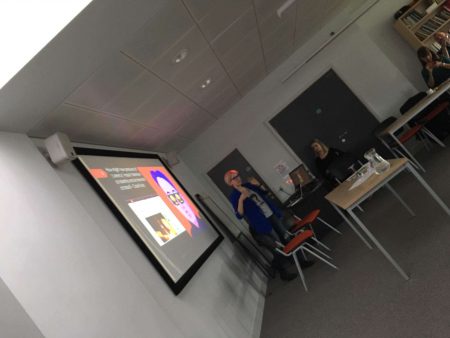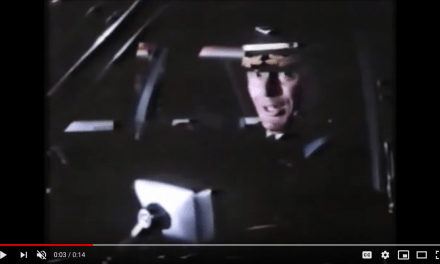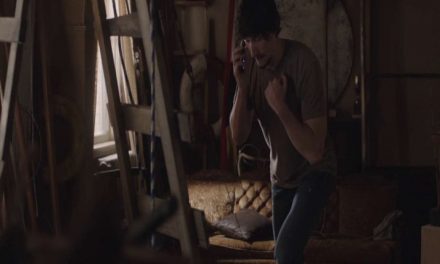It’s first week of teaching, two and a half weeks after the conference, and an element of the glow still lingers – as so often after a conference, there are moments that still vividly live in my memory. There is the moment when Helen Littleboy introduced the screening of Hospital (BBC, since 2016) by discussing her motivation to make a documentary that laid bare the failings of the NHS – but by pointing to the complex situation that NHS staff had to work in. She also highlighted that such a critique required an intensely local view, to the detriment of the potential of international exploitation which is now so central to the funding structures of broadcasting. I was particularly struck by one of her side-remarks which was something akin to ‘it is significant that it was the BBC that allowed us to do that’, offering a quick defence of public service broadcasting which similarly lacked the simple pathos that Hospital managed to avoid in comparison to other emergency department-focused TV series such as 999 – What’s Your Emergency (Channel 4, since 2012).
https://youtube.com/watch?v=i8VPeb7c0yg
But the most touching moment, for me as the organiser, came when Claire Grant, the general manager of the biggest TV station in Jamaica and scholar, said in a very few words how grateful she was to be at a conference where she could just focus on TV, without having to negotiate film or advertising or any other media. Her words were echoed by many others – including our wonderful keynote speaker Ruchi Kher Jaggi, who similarly pointed to a dearth of TV-only conferences in her experience. In many ways, that had been my motivation: to provide a space for us TV scholars to come together and talk TV, and I am glad that via Critical Studies in Television, which in itself was founded because at the time there was a dearth of scholarly journals dedicated to the study of TV, we have been able to achieve this.
Our wish to come together and speak as TV scholars, though, struck me also as significant because it suggests two things which might well be related. First seems to be the continuation of having to explain why the study of television is important. Several of the participants pointed to this age-old problem (the legitimation imperative as David Levente Palatinus called it) which still plagues our discipline. Many shared stories of colleagues or family members questioning or even ridiculing our motivations, and pointing either to the low-browness of the medium or its supersession by the internet and everything Netflix (aka ‘television is dead’). While one of my colleague pointed out to me, jokingly, that TV scholars seem to have a perpetual chip on our shoulders about this, it seems that unfortunately we also perpetually have to deal with the rather outdated distinctions (Bourdieu, 1979, Brunsdon, 2005) that continually require our defence. It’s boring, I know, but what else is there to do?
At the same time, there continues to be the wish for television scholarship to be allowed to be disciplinarily distinct, i.e. not media research or screen scholarship. What comments that pointed to that made evident was that television studies is understood to be a separate, independent discipline, multi-disciplinary at heart, but independent, and which has a strong research tradition that if presented to the uninitiated often needs introduction. By often being placed together with ‘media’ or ‘screen scholarship’, we find ourselves having to do the laborious task of introducing this tradition, which in the context of our Critical Studies conference was just not necessary. We all seemed to understand what we meant when we used certain words or used author’s names as our shorthand. In both cases, what became clear is that a TV-focused general conference gives us the opportunity to do less of this work of rescuing and introducing [and demarcating] the subject/discipline and instead focus on what is actually at the heart of our interest – our actual research projects. It is this wish to be able to have a forum where we can focus on our actual work that underlies much of our work at Critical Studies and that I hope we will be able to continue in 2 years’ time at the next conference.
Critical Studies in Television Conference 2018: Impressions
(all images courtesy of Bärbel Göbel-Stolz)
At the same time as I still bask in this warm glow of having achieved what I was motivated to do, I also remember the increasing anxiety in the weeks running up to it when I realised that more and more people had to drop out. Some of them dropped out for personal reasons – illness, family issues, etc. – but quite a few also had to drop out, or nearly dropped out, because the universities they worked for just didn’t provide the necessary funding. This seemed particularly prevalent in the British context, but not just. It suggests that part of our work is now no longer financially supported, that there is a rationing of our ability to network with people face to face at the same time as we are asked to evidence our (ideally international) networks more and more. What struck me about this, particularly in Britain, is that it seems to fit more generally into the gradual whittling away of our income which included a suggested change to our pension and below-inflation pay increases over the years. But as research indicates, this is an international problem. Our ability to go to conferences where we can present research, network, learn about other cutting-edge research which will inevitably inform our own research and teaching, is decreasingly seen as part of our job and increasingly as a privilege which the universities are willing to fund perhaps twice a year (if we are lucky, for one national, and one international conference, if we are unlucky, a small pot of a few £/€100 is supposed to cover everything). Imagine telling a manager that they from now on have to fund the attendance of national and international meetings where they will learn about new policies or regulations affecting their jobs and those they manage. Exactly.
Such reduction in funding is counterproductive also because our conferences often try and bring television production personnel to them where they can talk about their work in the context of our theoretical understanding of what they produce and we can learn about the day-to-day challenges and opportunities. The recent Transnational Television Drama conference at Aarhus was particularly good at that, whilst I have to admit I struggled to recruit people, but managed to organise an open event where the wonderful DoP Len Gowing came straight from a shoot to talk to us about the role of location and locality in his work. This being one of my research interests I thought it was fascinating, but it seems I wasn’t the only one.
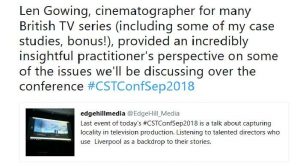 Within the neo-liberal university, the move to reducing funding for our further development (and instead calling training sessions on new policies or technology ‘development’) suggests a troubling tendency to shift the responsibility for (the perhaps more enjoyable) part of the job onto us. Alarmingly, some academics seem to suggest that is precisely the way forward. It fits into the narratives of self-improvement and self-construction which underlies too much of today’s discourses on education and have facilitated in the UK, but also elsewhere, the privatisation of the universities by charging students for their degrees. Perhaps, then, the sense of community that permeated the conference and that the wish for a ‘TV only’ conference expresses, can in the future be utilised to push back against these discourses to demand that employers recognise the wider benefits of all forms of education that go beyond the limited ideas of individual improvement.
Within the neo-liberal university, the move to reducing funding for our further development (and instead calling training sessions on new policies or technology ‘development’) suggests a troubling tendency to shift the responsibility for (the perhaps more enjoyable) part of the job onto us. Alarmingly, some academics seem to suggest that is precisely the way forward. It fits into the narratives of self-improvement and self-construction which underlies too much of today’s discourses on education and have facilitated in the UK, but also elsewhere, the privatisation of the universities by charging students for their degrees. Perhaps, then, the sense of community that permeated the conference and that the wish for a ‘TV only’ conference expresses, can in the future be utilised to push back against these discourses to demand that employers recognise the wider benefits of all forms of education that go beyond the limited ideas of individual improvement.
Elke Weissmann is Reader in Film and Television at Edge Hill University. She is currently considering changing this to Reader in Television and Film, however. Her books include Transnational Television Drama (Palgrave) and the edited collection Renewing Feminisms (I.B.Tauris) with Helen Thornham. She sits on the board of editors for Critical Studies in Television. She migrated to the UK in 2002 after realising that German television was as bad as she remembered.


